- Home
- Richard Powers
The Gold Bug Variations Page 3
The Gold Bug Variations Read online
Page 3
But the meter of that music was too rich and ambiguous to stick. By the time I reached the Reference Desk, the inappropriate euphoria over Dr. Ressler’s life—its triumphant grammar, however brief and bungled— was gone. Anticipation fell off into fatigue. I wanted only to go away from here for a moment, a lifetime, stay away as he did until I’d forgotten the layout of this place. Lose the old fixtures, erase what had happened, then wander back in at the beginning, take it from the top, enough time having passed to reclaim the sense of place, the time of year we had once lived through.
I spent this afternoon in my usual capacity, doling out facts. The ten most frequent letters in English. The weight of protein in a pound of peanuts. Each answer bitterly dedicated to my distant colleague in the information sciences, whom I once met over the Event of the Day. The events he set in motion were now the stuff of archives. But then it struck me, what I’d known and forgotten any number of times: the calendar is not a fixed record, an almanac of everything that ever happened indexed by a few hundred slots. Every calendar page also contains the anniversaries of everything that has not yet happened. Slowly, the ambushing tune came back—that exercise in stretching an unassuming dance beyond the counterbreakingpoint. Quieter, richer in independent voices, now a confident and compelling tempo, certain I’d take the required response. And this afternoon, just before closing shop, I gave, to the astonishment of my coworkers, my two weeks’ notice.
I am not sure, as I write this, too late at night, what I meant by quitting. I don’t know what I hope to do, what, if anything, I still can do to put things right. I only know that I am inextricably involved in what happened to the man. His story has become my story, and no one is left to tell his but me. Our showdown—our fight with the anniversaries that haven’t yet happpened—lasted just a little under a calendar year. But those few months were the only ones of my life that I experienced firsthand. I’ve wasted a year since, convinced that my continuing the quarrel alone was out of the question. Funny, the idea hitting me only now, so late in the day, so long after the fact. Tonight, for the first time in I can’t remember how long: the hint of possibility that always arrives with death. With news.
I sit typing in the dark. He’s really dead, then. Nothing works against it. I tick away, sick in the chest at all that never happened. Outside my window, on the river, the shortest night of the year already lifts. This absurd hour: I’d call Todd in a second, just to speak to the one other person who knows Dr. Ressler’s tune by ear. His note, brutal announcement of the end, provides me with entrée. Impossible; no idea how to reach him. I half expect my force of concentration to tip him off. Make my phone ring from sheer telepathy. But air is always the worst of carriers.
I must break for an hour’s sleep. The urge for something less ambiguous than more silence is unbearable. What do I have left to work with? What have I ever had but four seasons, four corners, four nucleotides? How can I name the man’s changes with only that? Only, once, touring the snowdrifted world, pointing out the spore, he asked, “What could be simpler? We all derive from the same four notes.”
II
WHO’S WHO IN THE AMERICAN MIDSECTION
For all that we finally discovered about him, Dr. Ressler still came from and returned to nowhere. His life was a cipher, his needs one of those latent anthologies, safe deposit boxes filled with tickets to urgent, forgotten banquets. Our sustained misreading of the man was my fault. Todd put me on his trail, and I went after him as an abstraction, a chemistry unknown that, mixed with the right reagent, reveals itself by going rose or precipitating. I looked for a postulate, completely missing the empiricist’s point. Now, when it no longer helps, I see the person he stood for is the one who is gone.
Our search for the reagent began two years ago. The branch again swelled to summer capacity with bored children and adults too ashamed for bathing suits. The alien figure from the previous autumn who’d known all about Ike’s coronary but hadn’t a sufficiently straightforward command of syntax to tell me I’d flubbed the day’s date had not returned, and my recollection of the run-in followed the standard extinction path. Months on, after a numbing bean curve of requests, I looked up from the Reference Desk at a face so untroubled and trusting as to instantly trigger any thinking woman’s suspicion. A man in mid-twenties lingering patiently like a parasitic vine for me to finish. His nose tilted friendlily when he at last got my attention. His eyebrows flashed greeting, sure I’d be as happy to see him as he was to see me. I returned the survivalist’s stare I’d learned on hitting the city: stand where you like—here, there, under the traffic in Columbus Circle. His grin persisted as we slid onto business footing. If anything, he got a kick at my failing to respond as effusively as invited. Without a trace of agitation, he said, “I want to know someone.”
I squelched the facetious comeback. Cutting cleverness, the chief weapon of my social life, was worthless at the branch. I kept mum until the clear-faced questioner corrected himself. He did so without the diffidence I expected from such ingenuous features. “I mean I’d like to identify someone. Find out who he is.” I waited, but he was in no hurry. Apparently he felt that anyone who couldn’t sift the evidence before it was spelled out would be unable to handle it after. “I’d like some information. Whatever you can find. I need an ID on this fellow.” He slipped me a scrap torn from a drawing notebook. Florid acanthus letters formed a man’s name. Aware that his writing was more cryptic than Linear A, he read out: “Stuart Ressler. Mean anything?”
I set the scrap down with exaggerated care. “Could you please be a little more vague?” I pride myself on working impartially, even for those whose sole purpose on earth is to propagate ravaging inanity. But this man was clearly too bright to be forgiven such a time waster. Bright enough to register facetiousness, in any case.
“Perhaps I ought to narrow the scale a mite. It’s just that you’re such a mind reader over the phone.”
“Sir, we have several librarians on staff, and any one of them …” I tried to catch the eye of the security guard, just coming around the periodicals.
“Oh, no. We’ve spoken a couple times. The text of Luther’s 95. Fast Fourier transforms. How much IBM to buy. Names of the flying reindeer.”
I cleared my throat; we were not yet amused. But he had proved himself at least marginally safe, unlikely to tote handguns down into the subway. “All right. I’ll help you, so long as you pay your taxes. This name: animal, vegetable …?”
“Funny you should ask.” He turned his face away, hiding. When he looked back, his boyish clarity had changed barometrically. “I’m certain he did important work once.”
The catch in his voice revealed that this wasn’t a simple round of Botticelli. “All right. You believe he’s in the records. I’ll trust you. What was the man’s line of work?”
My client grinned. “Don’t know for sure.” Sheepish, tickled. “Something hard. Something objective, I mean.”
His odd adjective reminded me of a quote I’d once identified: “Who seeks hard things, to him is the way hard.” That one had fallen trivially at the push of a concordance. But this: qualitatively different. Why associate difficulty with objective disciplines? Certainly the subjective morass is harder. “We can eliminate professional sports?” He laughed in agreement. “You don’t know the man’s field, but you’re sure he’s well-known. What were his dates?”
“Oh.” My question flushed the amusement from his eyes. “He’s still alive. And I didn’t say well-known. I said I was sure he’d done something important. Some real work once.” He spoke precisely if incoherently, sure that intelligibility would eventually, as with the current administration’s promised economic prosperity, trickle down.
“I see.” I hid my irritation by taking sparse notes. “Still living. Born …?” I finally prompted, “When?”
He thought long. Breaking through triumphantly, he said, “He is about twice as old as me. I know that for a fact. That means we can start in the early thirties, h
uh?”
I suggested he start a little higher, in the low forties, Fortieth to Forty-second, to be exact. “Sir. We’re just a neighborhood branch. If this person is as obscure as you make him out, you’ll have to go over to midtown.”
He sensed my shame in referring him to a higher authority. “You kidding? They’d laugh me off Manhattan.”
“Why shouldn’t we do the same?”
“Heard you don’t laugh as much here.” At which, I did.
Even as I tried to palm him off, I knew I wouldn’t let him go without first testing my skill. His softheaded question had a difficulty that hooked me. Solving it would be at least as valuable to the long-term survival of the race as determining Dorothy’s shoe size or supplying a six-letter word for a vehicle ending in U. “All right. What great thing, broadly speaking of course, do you think he did? How did you hear of him?”
“I work with him.”
It took no intuition to hear the warning buzzers. Those who want to get the drop on another—from term-papering schoolchildren to businessmen steeped in interoffice sabotage—outnumber all my other clients. I would not be party to spying on a coworker. But just about to hand back the paper scrap, I recalled how, at the moment when this man had joked about his acquaintance straddling animal and vegetable, he had hidden his hazel-and-bark face. Rather than return the name, I stiffened and held it, implicating myself for good.
Had I paid attention, I might have been quicker in drawing connections in the days ahead. But as in most informational work, content evaporates completely before the end of the shift. Specifics disappear, leaving just the trace of categories, methods. Archivists aren’t wellsprings of fact; they are search algorithms. The unfolding subway, the byzantine network of accumulating particulars—our Pyramid, Great Wall, St. Peter’s, the largest engineering feat of all time—daily runs a nip-and-tuck footrace between the facts worth saving and the technology for managing the explosion. A single day produces more print than centuries of antiquity. Magazines, newspapers, fliers, pamphlets, brochures: fifty thousand volumes annually in English alone, ten times what a person can read in a lifetime. Six new books every hour, each one the potential wave-tip that will put the whole retrieval system under. Dictionaries of dictionaries, encyclopedias of indices, compression tables into microfilm windows onto text bases. Even my sleepy branch has its desktop computer—a genus nonexistent ten years ago—that scans years of periodicals by subject, title, or author, in seconds returning a cartridge that plugs into a reader that zooms to the complete article in question, assuming the high schoolers haven’t wedged Slurpee cups into the mechanism. In summer ’83, I had every confidence in the power of my tools to crack the script. Two years of even more spectacular advances in retrieval, and I’m guttering in the dark.
One night not long ago Ressler, Todd, and I—contents, carrier, and cracker of that first ID—sat together in the hum of the computer room, its gigabytes of sensitive data in the sole care of these two vagrants, over stale bread, grocery-store Camembert, and Moselle. Expansive in the combination of tastes, Dr. Ressler remarked that people of last century could look at a musical score and hear the piece in their heads. “Name the work; they could hum the principal motifs. We’ve traded that for the ability to lay hands on a recording in five minutes, or your tax contribution back.” Affectionate burlesque of my trade, the one that for a moment recovered him from the heap of lost scores.
In that professional capacity, I didn’t for an instant doubt I’d be able to find the nub-penned name. Even without any contribution, Stuart Ressler was somewhere in the permanent files, many times, in immense Orwellian lists. Time, resources, and brute research could extract him. I needed only decide how much effort this other man, in his twenties, with the Bonnard coloration, was worth.
I try not to second-guess the social value of my daily assignments. From each according to his critical needs, to each according to my best retrieving abilities. I must believe that my clients are the best judge of what information they require. My colleague Mr. Scott, advanced degrees in anthro and philology as well as library science, hovering on the brink of eternally threatened retirement, pulling volumes to prove to this year’s perpetual motioneer that the latest ingenious scheme once again violates the Second Law, likes to sing the couplet:
They all laughed at Christopher Columbus when he said the world was round,
They all laughed when Edison recorded sound.
Skepticism sweetens Mr. Scott’s countertenor: all that sad, misdirected, highly trained skill, with only a once-an-epoch useful solution preventing his whole career from degenerating into a waste of shame. Scott, like everyone who looks things up for a living, prefers Gershwin to admitting that progress has destroyed our ability to tell which facts of the runaway file are worth recalling. Value is the one thing that can’t be looked up. I myself am sometimes shamefully pragmatic, cutting losses on a goose-chase, bowing out on diminishing returns: the awful ethical calculus that forces politicians to cut a deal, surgeons to choose which of three dying people to repair. My first impulse was to give this college boy a list of biographical dictionaries and ditch him until he’d run the legwork, by which point I would be safely over the informational border, joining Mr. Scott in retirement haven. Defensible, given the opacity of the question. But pride made me give it a preliminary nudge. However ill-defined, the ID was at least as diverting as rock stars’ birthdays.
We started at the top, the Who’s Whos. The boy annoyed me completely by trotting ahead, going down the spines saying, “Tried it, skipped it, tried it …”. Months later, he explained he was being funny. By then, I’d discovered that Frank Todd was a competent researcher. The only thing standing between him and Ph.D., aside from sense of humor, was excessive thoroughness. He belonged to the class that can’t get started writing, paralyzed by that last overlooked source. Franker perpetually budgeted another half year to mopping up; by the end of the period, the holdouts had proliferated. When I accused him of playing dumb at that first meeting, making me do the scutwork he could easily have done himself, he said, “Woman, have you ever seen yourself reach for the top shelves? Choice.”
I ignored him and began the elimination sieve. As I thumbed, he stood by, irritating me further by humming. His hum sounded like the vibration of the library air conditioning, so soft and sustained were the intervals. When I looked up he was standing shoulders hunched and eyes closed, conducting himself with the closed forefinger of his right hand, wrist curled in front of his chest like a gothic icon. I just made out the tune, the slow accretion of a haunting chord. Flirting between major and minor, it brushed me with the sad suggestion that I’d heard it before, something forgotten and irretrievable. It sounded like a decision I’d made about myself long ago. But I could only work on one mystery at a time and so kept reading rather than add a descant.
We came up with nothing, which neither surprised nor disappointed him. We searched the indices and traced the biographies back a decade. The mystery man had, by all appearance, written nothing of note; we combed the combined abstracts as far back as credible and came up empty-handed. The undertaking took us both—for the solo conductor at last broke from enchanted humming to lend a hand—all afternoon. I assured him that failure still taught us a great deal, narrowed the scope considerably. “We know, at least, where the mark doesn’t live.” I didn’t add that we’d greatly reduced the plausibility of the original hypothesis. My client stood dumbly by the card catalog, stuck his hands in his pockets, and waited for me to say what happened next.
I in turn waited for him to volunteer the reason why this search was so important. But his patience outlasted mine. In another moment, he might have gone back to humming. I gave in, ensuring another meeting. “I can run some electronic searches. But these are expensive if you don’t know what you’re looking for. Every vendor has a per-minute connect fee, and if you simply instruct them to grind away on an unspecified name …”. He continued to smile; I wasn’t sure he followed. “Then
charges add up.”
He spread his palms: Pay as you go? Don’t I always? His voice dropped a notch. “All I have is yours.”
I’m astonished to think how easily I slipped into flirtation. “Yes, but how much do you have?”
“Think Marx to Dumont on the ship’s gangplank in Night at the Opera.” Fifteen minutes after he left, I would produce the allusion. “I haven’t had any complaints yet.” I promised to tweak a few angles we hadn’t explored that afternoon. He nodded and agreed to find out more at the source. Then he troubled his voice into greatness. “We won’t give up so easily, will we? Not by a Lamb Chop.” I refused to grin. He turned to leave, but just before quitting the reference area he swung to face me. In one of those unexpected shifts in tone I learned to predict, he asked, “Are you beautiful?”
The question floored me less then than it does now. “Who wants to know?” I flipped back. The professional in me beat the provocateur, two out of three falls. Leaving that evening, I was still working on his parting shot. Was she beautiful? I said out loud, to no one, “Let’s answer the hard one first.”
WAS SHE BEAUTIFUL?
I’ve never thought so. Perhaps he did. Dr. Ressler lent a gracious second, always chivalrous. The whole inquiry hardly seems relevant anymore. Dead issue. Why is that answer ever crucial? Those third-party testimonials— she’s so trustworthy, loyal, helpful, friendly, courteous—are superfluous adjective catalogs without the key commodity—and so beautiful. Add that, and bored listeners beg for the chance to judge for themselves. The soberest article, mentioning good looks, sensationalizes mere journalism. She was beautiful. He was stunning. Porcelain, startling, deep, timeless, haunting: more than cosmetic. Political. Historical.
Custom downplays it, pretends that looks are a judgment call, denigrates the superficial. But the faintest suggestion of beauty and everyone’s off, Todd in the lead. A glimpse, and he couldn’t help myself: pretty form clamped his imagination, a credential for inner sense. Beautiful faces kept ineffable secrets he then needed to reveal. They knew something, something they might tell him if he could only get close enough, inhale, smother himself in their perfection. I’ve seen him stopped dead by the line of a woman coming carelessly out of a shop across the street. Perfect plumage chilled his heart. A classic face carried the imprint of another time, like those garbled message-dreams that distress the dreamer but reveal, to the skilled explicator, perpetual homesickness. For my friend, it was always the first question. Todd’s every ache was desire to return. And beauty mapped the way back.

 The Overstory
The Overstory Bewilderment
Bewilderment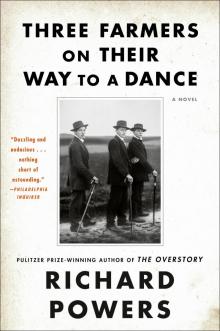 Three Farmers on Their Way to a Dance
Three Farmers on Their Way to a Dance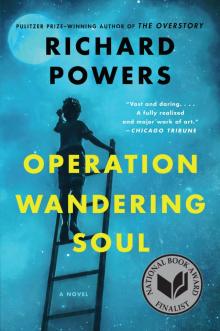 Operation Wandering Soul
Operation Wandering Soul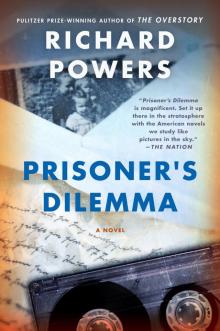 Prisoner's Dilemma
Prisoner's Dilemma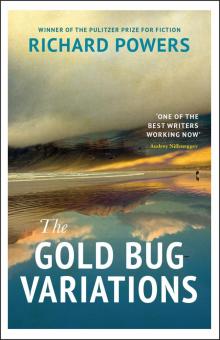 The Gold Bug Variations
The Gold Bug Variations Generosity: An Enhancement
Generosity: An Enhancement The Echo Maker
The Echo Maker Orfeo
Orfeo The Time of Our Singing
The Time of Our Singing PLOWING THE DARK
PLOWING THE DARK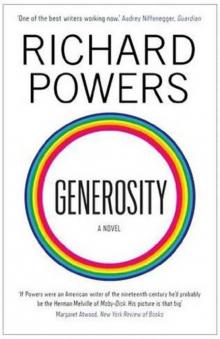 Generosity
Generosity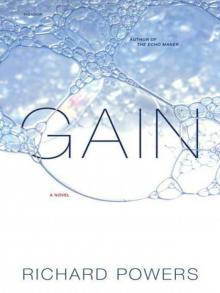 Gain
Gain